Reliable data is the answer to Africa’s $1 trillion agriculture opportunity
It is a truth universally acknowledged that access to reliable data in Africa is a massive challenge.


It is a truth universally acknowledged that access to reliable data in Africa is a massive challenge.
Just last week, the World Bank gave $50 million to the Kenyan Bureau of Statistics to help the body with better accumulation of data. “High-quality data are critical to measure progress in growing the economy, reducing poverty and fostering shared prosperity,” Diarietou Gaye, the bank’s country director for Kenya, said in a statement.
But as the saying goes, from a problem can emerge an opportunity. Sara Menker, a former Wall Street trader originally from Ethiopia, recognized this and founded Gro Intelligence, a data analytics firm focused on agriculture.
Despite the huge potential for agriculture on the continent, the sector has not grown as fast. In the 1980s, agricultural GDP growth in sub-Saharan Africa was 2.3% per year. Between 2000-2005 that only increased to 3.8% per year, the World Bank points out. Part of the reason for this is the market information available is too fragmented to provide a coherent sense of the state of the sector. ”If you went to ministries of agriculture in Kenya, Brazil and the US everybody has their own way classifying data,” Menker says.
Through Gro-Intelligence Menker has set out to plug that gap.
“We sit at this interesting intersection between engineering big data design and domain expertise,” Menker said recently at the Quartz Africa Innovators Summit in Nairobi. And her mission is “to create data products that a multitude of users – from governments, to the private sector – can use seamlessly.”
Africa has more than half of the world’s unused arable land, The World Bank says. Yet, countries like Brazil, Indonesia, and Thailand currently export more food products than all of Sub-Saharan Africa combined, the bank points out. Additionally, despite 65% of Africa’s labour force being in agriculture, Menker says, only “less than 1% of outstanding commercial bank loans actually go to the agricultural sector.”
But the potential for growth is there. At the moment the size of continent’s agricultural market stands at a little over $300 billion. By 2030, the World Bank suggests that it can grow to a $1 trillion.
To get there both investors and farmers need to be better educated about these markets. ”To create efficient agriculture markets, you need high quality data,” Menker points out. ”The cost of capital [is] simply too high for agriculture in Africa. To increase capital flows in agricultural markets you need really good data, a common language.”
She explains that part of the challenge the sector is facing, particularly in Africa, is that there is information asymmetry when it comes to agriculture. Only a few people in the market have the kind of data that can allow for a better trading relationship between the producer and the market. On top of that there exists little common language to overcome the disconnect.
Gro Intelligence is changing that.
“We have designed a classification system where any form of information that has to do with agriculture can map to our classification system so users can match to comparable sets of data,” Menker says.